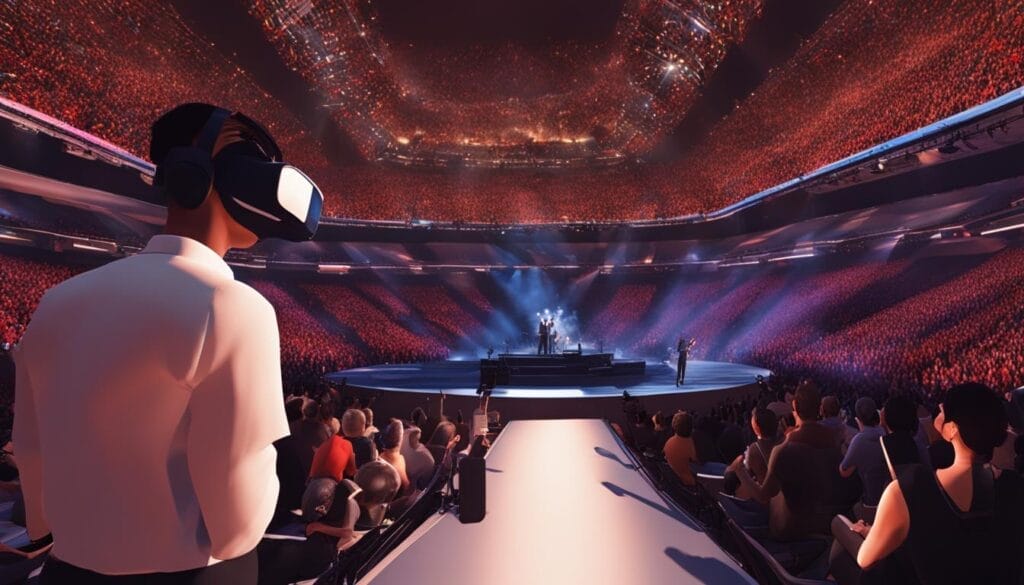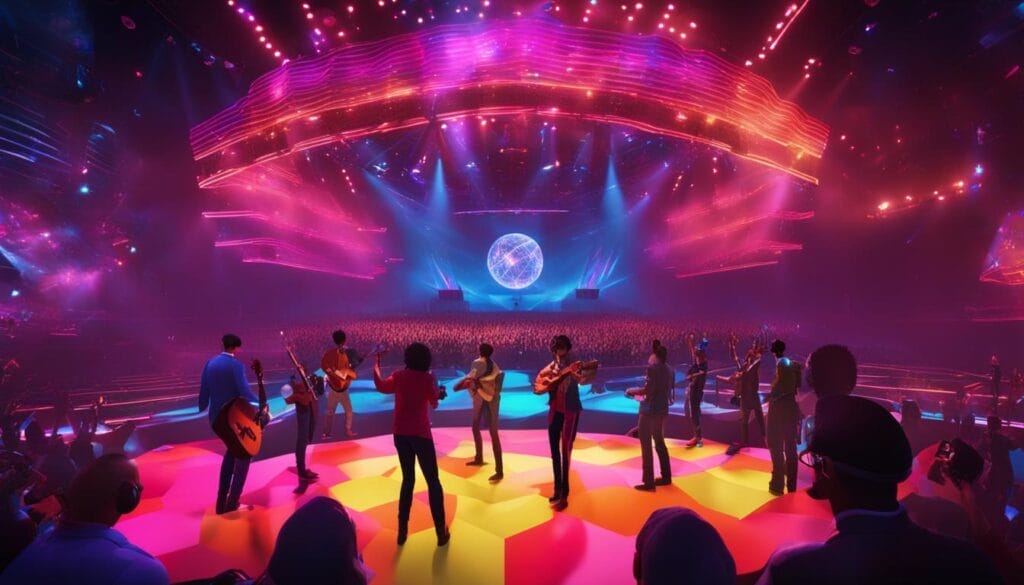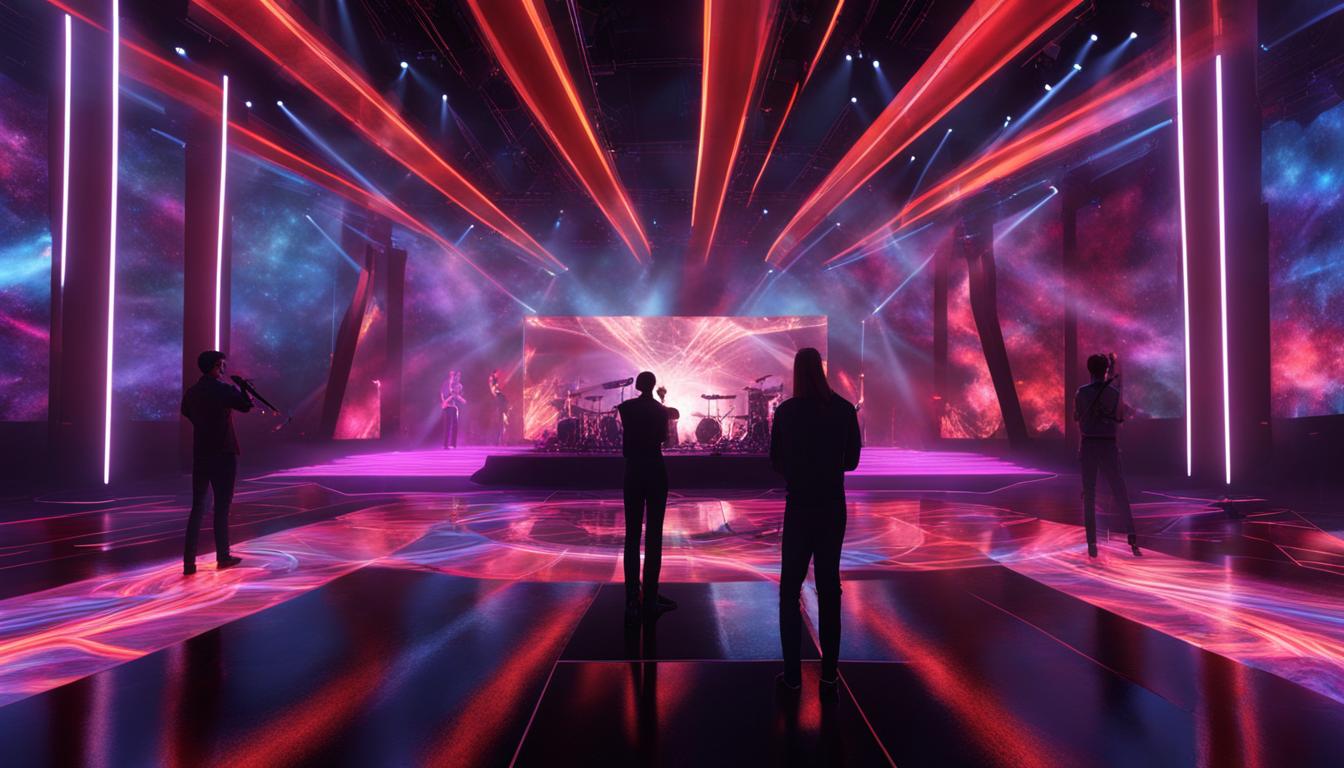The metaverse offers a unique and immersive platform for hosting concerts and shows. With the fusion of augmented reality (AR) and virtual reality (VR), event management in the metaverse has become a reality. This article will guide you through the steps of organizing and executing successful metaverse events, including concerts and shows.
Key Takeaways:
- Metaverse concerts and shows provide immersive digital performances for online audiences.
- Event management in the metaverse involves planning, coordination, and execution within virtual and augmented reality environments.
- Organizing successful metaverse events requires defining event goals, selecting the right platform, creating immersive content, and implementing effective marketing strategies.
- Considerations for hosting events in the metaverse include costs, comparing traditional events, addressing risks and challenges, and learning from successful virtual concert examples.
- Virtual concerts in the metaverse offer benefits such as increased audience reach, flexibility in content, and revenue generation opportunities.
Event Management in the Metaverse
Event management in the metaverse refers to the planning, coordination, and execution of events within virtual and augmented reality environments. This includes concerts, conferences, exhibitions, workshops, and social gatherings. The metaverse provides immersive digital environments that allow for unique and interactive experiences for attendees.
Virtual performances and online entertainment have become increasingly popular in the metaverse. Artists and event organizers are leveraging the power of technology to create captivating digital shows that transcend physical limitations. These digital experiences offer a new level of engagement and interactivity, allowing attendees to participate in a virtual world where they can explore, connect, and enjoy entertainment from the comfort of their own homes.
One of the advantages of event management in the metaverse is the ability to reach a global audience. Unlike traditional events that are bound by geographical constraints, virtual performances have the potential to attract attendees from all corners of the world. This opens up new opportunities for artists to expand their fan base and connect with fans on a global scale.
Benefits of Event Management in the Metaverse
Event management in the metaverse offers several benefits for both organizers and attendees:
- Global reach: Virtual performances have no geographical limitations, allowing artists to reach a global audience.
- Interactivity: The metaverse provides a platform for interactive experiences, where attendees can actively engage with the content and each other.
- Cost-effective: Hosting events in the metaverse can be more cost-effective compared to traditional venues, as there are no physical overhead costs.
- Flexibility: Virtual events offer flexibility in terms of scheduling, content format, and customization options, allowing for dynamic and unique experiences.
- Data analytics: Virtual events provide detailed analytics and insights that can help organizers understand attendee behavior and preferences.
By harnessing the power of the metaverse, event management is evolving into a new era of immersive digital experiences. The possibilities for creating innovative and engaging events in the metaverse are endless, offering exciting opportunities for artists, organizers, and attendees alike. Whether it’s a virtual concert, an interactive exhibition, or a global conference, the metaverse is revolutionizing the way we think about and experience entertainment.
Steps to Host an Event in the Metaverse
Hosting an event in the metaverse can be an exciting and innovative way to engage with audiences through virtual concert experiences, augmented reality performances, and interactive digital shows. To ensure a successful event, it’s important to follow a series of steps that will help you plan, execute, and promote your metaverse event.
Step 1: Define Your Event Concept and Goals
The first step in hosting an event in the metaverse is to define your event concept and goals. Determine the type of event you want to host, whether it’s a virtual concert, a theater performance, or an art exhibition. Consider your target audience and the overall experience you want to create. This will help you set clear objectives and align your event strategy accordingly.
Step 2: Select the Right Metaverse Platform
Choosing the right metaverse platform is crucial for the success of your event. Research different platforms and assess their features, capabilities, and user base. Look for platforms that offer seamless integration of virtual and augmented reality technologies, interactive features, and scalability. Consider factors such as user experience, customization options, and technical support to ensure a smooth event experience for both organizers and attendees.
Step 3: Content Creation and Technical Setup
Creating compelling content and setting up the technical aspects of your metaverse event are key to providing an immersive experience. Develop visually engaging virtual stages, avatars, and interactive elements that align with your event concept. Collaborate with artists, designers, and developers to bring your vision to life. Ensure that the technical setup, including audio-visual equipment, streaming capabilities, and real-time interaction tools, is tested and optimized for a seamless experience.
Step 4: Marketing and Promotion Strategies
Once your event is planned and set up, it’s essential to implement effective marketing and promotion strategies to attract attendees. Leverage social media platforms, email marketing, press releases, and influencer partnerships to create buzz and generate interest. Highlight the unique aspects of your metaverse event, such as the immersive experience, interactive features, and the opportunity to connect with global audiences. Offer early bird discounts, exclusive merchandising, and behind-the-scenes content to incentivize attendance.
By following these steps, you can host a successful metaverse event that captivates audiences with virtual concert experiences, augmented reality performances, and interactive digital shows. With careful planning, strategic execution, and creative content, your event in the metaverse can provide an unforgettable experience for attendees from all over the world.
Cost of Hosting an Event in the Metaverse
The cost of hosting an event in the metaverse can vary depending on several factors. These factors include the complexity of the event, the selected metaverse platform, the number of attendees, and the desired level of customization. It is important to carefully consider these factors when planning a metaverse event to ensure a successful and financially feasible experience.
One of the main expenses associated with hosting a metaverse event is the audio-visual gear. This includes high-quality cameras, microphones, and speakers to ensure a seamless streaming experience. Additionally, streaming services may be required to broadcast the event to a global audience.
Technical support is another cost to consider when hosting an event in the metaverse. This includes hiring professionals who are experienced with the chosen metaverse platform and can provide assistance with setup, troubleshooting, and ensuring a smooth execution of the event.
Marketing and content production are also important aspects of hosting a metaverse event. Investing in effective marketing strategies to promote the event and attract attendees is crucial. Content creation, such as 3D visuals, interactive experiences, and virtual stage design, adds to the overall production costs.
A detailed budget should be prepared, taking into account all these expenses and evaluating potential revenue streams. This will help organizers gauge the financial feasibility of the event and make necessary adjustments to ensure a successful and profitable metaverse experience.
Traditional Events vs. Metaverse Events
Traditional events and metaverse events offer different paradigms of gathering and engagement. While traditional events rely on physical interactions and geographical limitations, metaverse events take place in virtual environments and allow for global participation. Metaverse events provide immersive digital experiences and showcase the evolving landscape of event hosting in an interconnected world.
Traditional events, such as concerts and shows held in physical venues, have long been the norm for live entertainment. They offer the tangible experience of being present in the same space as the performers, feeling the energy of the crowd, and enjoying the ambiance of the venue. However, traditional events are bound by geographical limitations, requiring attendees to travel to a specific location to participate. This can be a barrier for some people due to distance, cost, or time constraints.
In contrast, metaverse events transcend these limitations by creating digital spaces where people can gather and interact virtually. These events take advantage of advanced technologies, such as virtual reality and augmented reality, to provide immersive experiences that mimic the real world or offer completely unique environments. Virtual concerts, for example, can transport attendees to fantastical venues or allow them to interact with virtual avatars of their favorite artists.
Metaverse events provide a new level of accessibility and inclusivity, allowing people from all over the world to participate in the same event without the need for physical travel.
In addition to the global reach, metaverse events offer other advantages over traditional events. They can accommodate larger audiences, as virtual spaces have the potential to host an unlimited number of participants. This opens up opportunities for artists to reach a wider fan base and for event organizers to generate more revenue through ticket sales or virtual merchandise. Furthermore, metaverse events can be more cost-effective to organize, as they eliminate expenses associated with venue rental, travel, and logistics.
| Traditional Events | Metaverse Events | |
|---|---|---|
| Geographical Limitations | Require physical travel to a specific location | No geographical limitations, accessible from anywhere |
| Capacity | Limited by venue size | Potentially unlimited capacity |
| Accessibility | May exclude people due to distance, cost, or time constraints | Accessible to people worldwide |
| Cost | Expenses for venue rental, travel, and logistics | Potentially lower costs with no physical infrastructure |
Risks and Challenges of Hosting Virtual Events in the Metaverse

While hosting virtual events in the metaverse brings exciting opportunities for immersive experiences and global reach, it also comes with its fair share of risks and challenges. It’s important for organizers to be aware of these potential pitfalls and take proactive measures to mitigate them.
One of the main challenges is the occurrence of technical difficulties. Since virtual events heavily rely on technology, there is always a risk of connectivity issues, lag, or system failures that can disrupt the event experience for attendees. Organizers must ensure they have a robust technical setup with redundant systems and reliable internet connections to minimize the chances of such disruptions.
Privacy violations are another concern when hosting virtual events. With the increasing prevalence of online communication, there is a higher risk of unauthorized recording, sharing of sensitive information, or harassment. To tackle this issue, it’s vital for organizers to implement strict data security measures, educate attendees about privacy policies, and provide clear channels for reporting any incidents of misconduct.
“Virtual events come with their own set of challenges, and it’s crucial to address them proactively to create a safe and enjoyable experience for all participants,” says Sarah Johnson, an event organizer with experience in the metaverse. “By closely monitoring the event, enforcing community guidelines, and maintaining open lines of communication, organizers can mitigate risks and ensure a positive virtual event environment.”
Lastly, virtual events lack the tangible cues and body language that are present in traditional in-person events. This can sometimes lead to miscommunication or misunderstandings among attendees. To overcome this challenge, organizers can establish clear guidelines for behavior, provide opportunities for interaction and engagement, and encourage communication through various channels such as chat forums or virtual networking spaces.
By addressing these risks and challenges head-on, event organizers can create a secure and enjoyable virtual event environment that fosters meaningful connections and memorable experiences for attendees.
Examples of Successful Virtual Concerts in the Metaverse

Virtual concerts in the metaverse have taken entertainment to new heights, offering fans unique and immersive experiences. Artists like Justin Bieber, Travis Scott, and Ariana Grande have embraced this digital medium, hosting successful virtual performances that have captivated audiences worldwide. These concerts have showcased the possibilities of augmented reality (AR) performances and virtual concert experiences, bringing fans closer to their favorite artists in ways never seen before.
One notable example is Travis Scott’s virtual concert in Fortnite, one of the world’s most popular video games. The event attracted over 12 million live viewers and showcased stunning visuals, interactive elements, and a larger-than-life virtual stage. Travis Scott’s avatar performed in front of a virtual crowd, creating an electrifying atmosphere that resonated with fans around the globe. This virtual concert experience blurred the lines between reality and fantasy, leaving a lasting impact on its audience.
Another successful virtual concert was Justin Bieber’s performance in the metaverse. Bieber’s team utilized motion capture technology to project his avatar onto a virtual stage, allowing him to interact with fans in real-time. The concert took place in a specialized metaverse platform, providing a visually stunning and interactive environment for attendees. With millions of virtual concertgoers, Justin Bieber’s event demonstrated the potential for metaverse concerts to reach a massive global audience.
| Artist | Metaverse Platform | Virtual Venue | Attendance |
|---|---|---|---|
| Travis Scott | Fortnite | Virtual stage within the game | Over 12 million live viewers |
| Justin Bieber | Specialized metaverse platform | Custom virtual venue | Millions of virtual concertgoers |
Virtual concerts in the metaverse have the power to transcend physical limitations and provide unforgettable experiences for both artists and fans. The combination of augmented reality performances, interactive virtual stages, and global reach creates a truly immersive environment that traditional concerts cannot replicate.
These successful examples of virtual concerts in the metaverse have sparked a wave of innovation in the entertainment industry. Artists and event organizers are exploring the limitless possibilities offered by this digital realm, pushing boundaries and reimagining how live performances can be delivered and experienced. As technology continues to evolve, we can expect even more groundbreaking virtual concert experiences to emerge, revolutionizing the way we enjoy music and entertainment.
Benefits of Hosting Virtual Concerts
Hosting virtual concerts offers several benefits in the metaverse. Firstly, it allows for a larger audience reach as there are no geographical limitations. Virtual concerts can be accessed by anyone with an internet connection, enabling artists to connect with fans from all over the world. This global reach opens up new opportunities for exposure and fan engagement.
Secondly, virtual concerts provide more flexibility in terms of show format and content. Artists can create unique and immersive digital performances that go beyond the constraints of traditional live shows. They can experiment with visual effects, interactive elements, and virtual stages to create unforgettable experiences for their audience.
Furthermore, virtual concerts can be used as a marketing opportunity to promote brands or products. Artists can collaborate with sponsors to integrate their products into the virtual concert experience, generating additional revenue and raising brand awareness. This creates a win-win situation where artists can monetize their performances while sponsors reach a highly engaged audience.
Lastly, virtual concerts can generate revenue through ticket sales and advertising sponsorships. By offering virtual tickets at affordable prices, artists can reach a wider audience and potentially sell more tickets than a physical venue can accommodate. Additionally, virtual concerts can include in-show advertising or partnerships with brands, providing additional revenue streams.
Overall, hosting virtual concerts in the metaverse provides a range of benefits such as global audience reach, creative flexibility, marketing opportunities, and revenue generation. As the metaverse continues to evolve, virtual concerts offer a glimpse into the future of live entertainment, providing immersive digital performances and online concerts that captivate audiences around the world.
Conclusion
The emergence of metaverse entertainment has revolutionized the world of live performances, offering a captivating and immersive experience for audiences. Virtual performances and shows in the metaverse have redefined the possibilities of online entertainment, showcasing the potential of digital shows in the modern era.
By leveraging the power of augmented and virtual reality, metaverse events have opened up new avenues for artists to connect with global audiences. With virtual concerts and shows, artists can transcend geographical limitations, reaching fans from all corners of the world. The metaverse provides an interactive platform that allows for unique and engaging experiences, taking entertainment to a whole new level.
Online entertainment in the metaverse offers numerous benefits, from increased audience reach to flexible show formats. Artists and event organizers can explore creative possibilities, experimenting with innovative concepts to captivate and entertain viewers. Virtual performances also present opportunities for brand promotions and revenue generation through ticket sales and sponsorships.
As technology continues to evolve, the metaverse is expected to shape the future of live entertainment. By following the steps outlined in this article, event organizers can tap into the potential of metaverse entertainment, creating memorable experiences that immerse audiences in digital worlds of music, art, and beyond.
FAQ
What is event management in the metaverse?
Event management in the metaverse refers to the planning, coordination, and execution of events within virtual and augmented reality environments.
What types of events can be hosted in the metaverse?
Events that can be hosted in the metaverse include concerts, conferences, exhibitions, workshops, and social gatherings.
What are the key steps to hosting an event in the metaverse?
The key steps to hosting an event in the metaverse include defining the event concept and goals, selecting the right metaverse platform, creating immersive content, implementing marketing strategies, executing the event, and engaging in post-event activities.
How much does it cost to host an event in the metaverse?
The cost of hosting an event in the metaverse can vary depending on factors such as the complexity of the event, the selected metaverse platform, the number of attendees, and the desired level of customization.
How do traditional events differ from metaverse events?
Traditional events rely on physical interactions and geographical limitations, whereas metaverse events take place in virtual environments and allow for global participation.
What challenges are associated with hosting virtual events in the metaverse?
Challenges associated with hosting virtual events in the metaverse include increased harassment, privacy violations, technical difficulties, and potential misunderstandings due to the lack of tangible cues.
Can you provide examples of successful virtual concerts in the metaverse?
Yes, virtual concerts by artists like Justin Bieber, Travis Scott, and Ariana Grande have gained popularity and utilized motion capture technology to project avatars onto virtual stages within virtual reality.
What are the benefits of hosting virtual concerts in the metaverse?
Virtual concerts offer a larger audience reach, more flexibility in show format and content, marketing opportunities, and revenue generation through ticket sales and advertising sponsorships.





